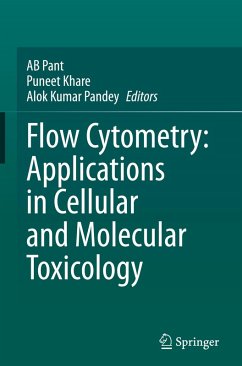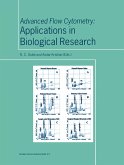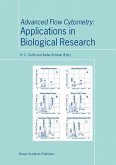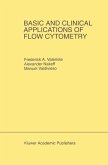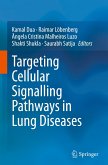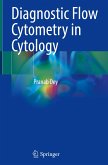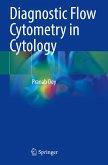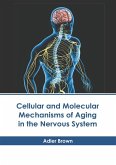Flow Cytometry: Applications in Cellular and Molecular Toxicology
Herausgegeben:Pant, AB; Khare, Puneet; Pandey, Alok Kumar
Flow Cytometry: Applications in Cellular and Molecular Toxicology
Herausgegeben:Pant, AB; Khare, Puneet; Pandey, Alok Kumar
- Gebundenes Buch
- Merkliste
- Auf die Merkliste
- Bewerten Bewerten
- Teilen
- Produkt teilen
- Produkterinnerung
- Produkterinnerung
The book explores the role of flow cytometry in varied fields, from clinical diagnosis to toxicology. This comprehensive book offers insights into biomarkers, cellular analysis, and safety evaluations. Organized into fifteen chapters, this book explores flowcytometry's historical journey, scientific validation, and implementation in toxicity studies with case studies, technical and applied approaches, pictorial representations, informative tables, and simple language, It will be an invaluable resource for researchers, academia, biopharma industries, graduate and postgraduate students, Ph.D.,…mehr
Andere Kunden interessierten sich auch für
![Advanced Flow Cytometry: Applications in Biological Research Advanced Flow Cytometry: Applications in Biological Research]() Advanced Flow Cytometry: Applications in Biological Research83,99 €
Advanced Flow Cytometry: Applications in Biological Research83,99 €![Advanced Flow Cytometry: Applications in Biological Research Advanced Flow Cytometry: Applications in Biological Research]() SobtiAdvanced Flow Cytometry: Applications in Biological Research83,99 €
SobtiAdvanced Flow Cytometry: Applications in Biological Research83,99 €![Basic and Clinical Applications of Flow Cytometry Basic and Clinical Applications of Flow Cytometry]() Basic and Clinical Applications of Flow Cytometry125,99 €
Basic and Clinical Applications of Flow Cytometry125,99 €![Targeting Cellular Signalling Pathways in Lung Diseases Targeting Cellular Signalling Pathways in Lung Diseases]() Targeting Cellular Signalling Pathways in Lung Diseases150,99 €
Targeting Cellular Signalling Pathways in Lung Diseases150,99 €![Diagnostic Flow Cytometry in Cytology Diagnostic Flow Cytometry in Cytology]() Pranab DeyDiagnostic Flow Cytometry in Cytology81,99 €
Pranab DeyDiagnostic Flow Cytometry in Cytology81,99 €![Diagnostic Flow Cytometry in Cytology Diagnostic Flow Cytometry in Cytology]() Pranab DeyDiagnostic Flow Cytometry in Cytology53,99 €
Pranab DeyDiagnostic Flow Cytometry in Cytology53,99 €![Cellular and Molecular Mechanisms of Aging in the Nervous System Cellular and Molecular Mechanisms of Aging in the Nervous System]() Cellular and Molecular Mechanisms of Aging in the Nervous System164,99 €
Cellular and Molecular Mechanisms of Aging in the Nervous System164,99 €-
-
-
The book explores the role of flow cytometry in varied fields, from clinical diagnosis to toxicology. This comprehensive book offers insights into biomarkers, cellular analysis, and safety evaluations. Organized into fifteen chapters, this book explores flowcytometry's historical journey, scientific validation, and implementation in toxicity studies with case studies, technical and applied approaches, pictorial representations, informative tables, and simple language, It will be an invaluable resource for researchers, academia, biopharma industries, graduate and postgraduate students, Ph.D., and post-doctoral fellows working in the fields of toxicology/biosafety, and biomedical research.
Produktdetails
- Produktdetails
- Verlag: Springer / Springer Nature Singapore / Springer, Berlin
- Artikelnr. des Verlages: 978-981-97-9757-8
- Seitenzahl: 316
- Erscheinungstermin: 23. Januar 2025
- Englisch
- Abmessung: 241mm x 160mm x 22mm
- Gewicht: 641g
- ISBN-13: 9789819797578
- ISBN-10: 9819797578
- Artikelnr.: 71783596
- Herstellerkennzeichnung Die Herstellerinformationen sind derzeit nicht verfügbar.
- Verlag: Springer / Springer Nature Singapore / Springer, Berlin
- Artikelnr. des Verlages: 978-981-97-9757-8
- Seitenzahl: 316
- Erscheinungstermin: 23. Januar 2025
- Englisch
- Abmessung: 241mm x 160mm x 22mm
- Gewicht: 641g
- ISBN-13: 9789819797578
- ISBN-10: 9819797578
- Artikelnr.: 71783596
- Herstellerkennzeichnung Die Herstellerinformationen sind derzeit nicht verfügbar.
Professor AB Pant is a seasoned toxicologist who started his research career over thirty-two years back at CSIR-Central Drug Research Institute, Lucknow, India. He is an alumnus of IIT-Roorkee, Uttarakhand, and is currently serving as 'Sr. Principal Scientist at CSIR-Indian Institute of Toxicology Research, Lucknow. He also serves as a "Professor" of the Academy of Scientific & Innovative Research (AcSIR), an Institution of National Importance set up by the Act of Parliament. Professor Pant's elegant research offers a much-sought framework for understanding neurodegenerative disorders, potential therapeutic interventions, and a strong base for interpreting human brain-specific neurotoxicity and developmental neurotoxicity using stem cells as models. His strategic international collaboration with the University of São Paulo, Brazil, has developed a strong roadmap for effective drug development and therapeutic interventions in Amyotrophic Lateral Sclerosis, a fatal neurodegenerative disorder. Being a nodal Scientist, Professor Pant coordinated COVID-19-related activities, including Real-Time PCR-based testing, SARS-Co-V2 genome sequencing, sero-surveillance, and capacity building program at CSIR-IITR. Professor Pant was instrumental in establishing the "Africa Centre of Excellence in Materials, Product Development and Nanotechnology" at Makerere University, Uganda. He also dedicated himself to fostering contemporary science to Post-Graduate PhD students, researchers, and university teachers. He is a lead GLP inspector for the Government of India. Also, he serves as an expert for regulatory bodies, such as BIS, CDSCO, NABL, FSSAI, NGCMA, ICMR, DST, Pharmacovigilance, etc. Professor Pant has won several awards and honors, including the Vigyan Ratna Award-2010 (CST UP); Shakuntala Amir Chand Prize-2007 (ICMR); National Bioscience Award-2012 (DBT); Prof. KT Shetty Memorial Oration Award-2017 (Indian Academy of Neurosciences), Toxicology Promotion Award-2018 (National Academy of Sciences, Allahabad), DSc-h.c. (HNB Uttarakhand Medical Education University, Dehradun, Uttarakhand-2021), STOX/ASAW Gold Medal (STOX, India), etc. He has been elected Fellow of Academy of Toxicological Sciences, USA, Society of Toxicology, India, Indian Academy of Neurosciences, Academy of Sciences for Animal Welfare, India, Academy of Environmental Biology India, etc. In view of his outstanding credibility in toxicology, Professor Pant has been included as a global toxicologist in the 'European and United Kingdom Register of Toxicologists'. He serves as Chairman and Member of several National and International Committees/ Boards of Government Institutes and Bodies. He also serves as a member of the editorial board of several reputed journals. His highly recommended books are- "Footprints of Toxicology in India" and "Dictionary of Toxicology". Dr Puneet Khare is a Senior Technical Officer in the Central Flow Cytometry Facility at the CSIR-Indian Institute of Toxicology Research, Lucknow, India. He did his PhD in Biochemistry from Babu Banarasi Das University, Lucknow, India. His area of specialization is flow cytometry and in vitro cell culture. In a decade-long research career, Dr Khare has established himself as one of the pioneers in the area of flowcytometry / in vitro toxicology with special reference to marker-based studies using flowcytometry. Over a period, he enriched himself as an expert for flowcytometric based detection of toxic responses in primary culture and immortalized cells of human and animal origin and plant and bacterial cells as well. Besides the laboratory work, he has also been involved in fostering contemporary science to Post-Graduate PhD students, researchers, and university teachers. Dr Alok K Pandey is a Senior Principal Scientist in the Nanomaterial Toxicology Laboratory at CSIR-Indian Institute of Toxicology Research, Lucknow, India. He is the Group Leader of the Biological Instrumentation facility (including Flowcytometry, TEM, SEM, and Confocal Microscopes). He earned his PhD degree in Environmental Sciences from the University of Lucknow. His area of work includes Nanomaterial Toxicology and Genetic toxicology. His current research involves deciphering the cytogenetic, cell cycle and apoptotic mechanistic insights of nanomaterial toxicity using in vitro and in vivo models. The work is also being carried out to understand the impact of nanomaterials on non-target species in various ecological strata. Dr Pandey also serves as an Associate Professor in the Academy of Scientific and Innovative Research (AcSIR), an institution of National Importance set up by the Act of Parliament. He is coordinating one of the highly specialized courses for PhD aspirants under AcSIR. He has various research publications in international journals of high repute and many book chapters. He also serves as an Editor/Reviewer in a few journals.
.- Chapter 1: Cell sorting: underpinnings and contemporary developments
.- Chapter 2: Xenobiotics mediated alterations in DNA content and cell cycle: Flowcytometry-based analysis
.- Chapter 3: Flowcytometric evaluation of mitochondrial health
.- Chapter 4: Environmental stressors-mediated apoptosis & autophagy detected through flowcytometry
.- Chapter 5: Role of flowcytometry in the rapid assessment of organ-specific toxicity
.- Chapter 6: Flowcytometry-based assays in genotoxicity
.- Chapter 7: Application of Flowcytometry in elucidating the intricate mechanism of neurotoxicity
.- Chapter 8: Imagination of hematotoxicity/ immunotoxicity without flowcytometry
.- Chapter 9: Role of flowcytometry in the safety/toxicity analysis of cosmetics and personal care products
.- Chapter 10:Flow cytometric approaches in clinical diagnostics
.- Chapter 11_Cellular uptake of nanoparticles: A flowcytometry insights
.- Chapter 12_Flowcytometric capturing of nanoparticles internalization in the cell system
.- Chapter 13_Application of flow cytometry in the development of new alternative model systems in biomedical research.
.- Chapter 2: Xenobiotics mediated alterations in DNA content and cell cycle: Flowcytometry-based analysis
.- Chapter 3: Flowcytometric evaluation of mitochondrial health
.- Chapter 4: Environmental stressors-mediated apoptosis & autophagy detected through flowcytometry
.- Chapter 5: Role of flowcytometry in the rapid assessment of organ-specific toxicity
.- Chapter 6: Flowcytometry-based assays in genotoxicity
.- Chapter 7: Application of Flowcytometry in elucidating the intricate mechanism of neurotoxicity
.- Chapter 8: Imagination of hematotoxicity/ immunotoxicity without flowcytometry
.- Chapter 9: Role of flowcytometry in the safety/toxicity analysis of cosmetics and personal care products
.- Chapter 10:Flow cytometric approaches in clinical diagnostics
.- Chapter 11_Cellular uptake of nanoparticles: A flowcytometry insights
.- Chapter 12_Flowcytometric capturing of nanoparticles internalization in the cell system
.- Chapter 13_Application of flow cytometry in the development of new alternative model systems in biomedical research.
.- Chapter 1: Cell sorting: underpinnings and contemporary developments
.- Chapter 2: Xenobiotics mediated alterations in DNA content and cell cycle: Flowcytometry-based analysis
.- Chapter 3: Flowcytometric evaluation of mitochondrial health
.- Chapter 4: Environmental stressors-mediated apoptosis & autophagy detected through flowcytometry
.- Chapter 5: Role of flowcytometry in the rapid assessment of organ-specific toxicity
.- Chapter 6: Flowcytometry-based assays in genotoxicity
.- Chapter 7: Application of Flowcytometry in elucidating the intricate mechanism of neurotoxicity
.- Chapter 8: Imagination of hematotoxicity/ immunotoxicity without flowcytometry
.- Chapter 9: Role of flowcytometry in the safety/toxicity analysis of cosmetics and personal care products
.- Chapter 10:Flow cytometric approaches in clinical diagnostics
.- Chapter 11_Cellular uptake of nanoparticles: A flowcytometry insights
.- Chapter 12_Flowcytometric capturing of nanoparticles internalization in the cell system
.- Chapter 13_Application of flow cytometry in the development of new alternative model systems in biomedical research.
.- Chapter 2: Xenobiotics mediated alterations in DNA content and cell cycle: Flowcytometry-based analysis
.- Chapter 3: Flowcytometric evaluation of mitochondrial health
.- Chapter 4: Environmental stressors-mediated apoptosis & autophagy detected through flowcytometry
.- Chapter 5: Role of flowcytometry in the rapid assessment of organ-specific toxicity
.- Chapter 6: Flowcytometry-based assays in genotoxicity
.- Chapter 7: Application of Flowcytometry in elucidating the intricate mechanism of neurotoxicity
.- Chapter 8: Imagination of hematotoxicity/ immunotoxicity without flowcytometry
.- Chapter 9: Role of flowcytometry in the safety/toxicity analysis of cosmetics and personal care products
.- Chapter 10:Flow cytometric approaches in clinical diagnostics
.- Chapter 11_Cellular uptake of nanoparticles: A flowcytometry insights
.- Chapter 12_Flowcytometric capturing of nanoparticles internalization in the cell system
.- Chapter 13_Application of flow cytometry in the development of new alternative model systems in biomedical research.

